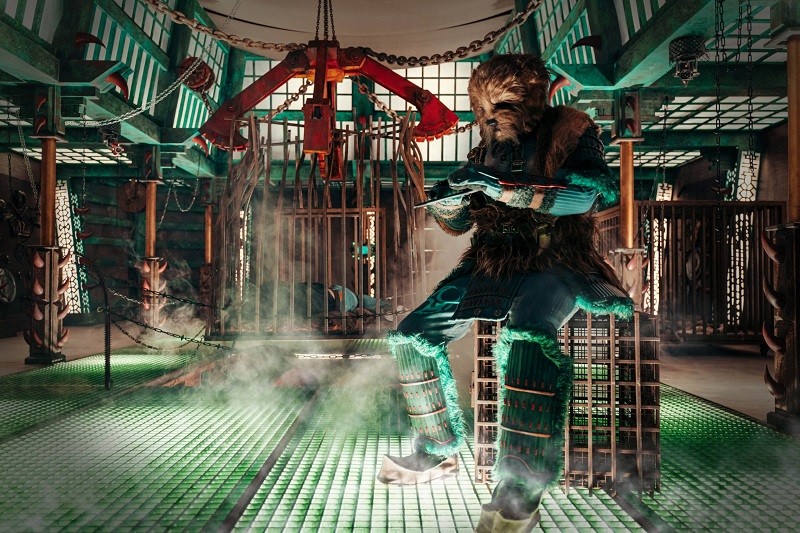One thing that cannot be taken away from the Chris Chibnall era of Doctor Who is a willingness to heavily experiment with the format. From a season with all new monsters to the first full-time four-person Tardis crews since the ‘80s to a focus on historical episodes that honestly hasn’t been seen since the Hartnell years, the show has never been more liquid when it comes to what audiences expect, and that’s even without delving into the actual storylines.
Flux is also a bold move for the franchise. This season will be a six-part contained story, something closer to WandaVison than traditional Doctor Who, which even during some like “The Trial of a Time Lord” maintained the feeling of individual adventures. Messing with that outside of the are two or three-parter is really screwing with the fundamental mechanics of the show. How is it going?
Results are mixed.
There’s a lot to love in Flux. A big bad from the dawn of the universe is set free in the form of Swarm, a sort of Hellraiser-lite villain played by Sam Spruell who absorbs other beings. Like Tim Shaw, he appears to be a great new addition to the rogue’s gallery. We also get alien puppies who try to save all humanity because man and dog are eternally linked, which is so goofy that it’s actually really effective. Doctor Who is always at its best when it’s being slightly ridiculous.
That’s helped enormously by new companion Dan. Famously funny John Bishop does a fantastic turn as our rookie adventurer, and he instantly bonds well with Yaz and The Doctor. Frankly, we haven’t had a companion since Donna who was so quick to roll with the punches aliens and time travel could throw. As disappointed as I am that we couldn’t finally have Yaz and The Doctor alone to work on their relationship like the best parts of Tennant years, there’s no doubt Dan is an instant shot in the arm.
The problem is mostly that Chibnall has gotten more and more chaotic as a writer and showrunner, and the eight million mysteries Flux sets up feel less like puzzle pieces and more like a chest of broken toys. At least four different plot points were started and dropped without any coherent explanation. Why are the Sontarans here? Who is the lonely pilot on the observation station? What are they digging in Nineteenth Century Liverpool? Why is The Doctor once again being so damn secretive and mean to Yaz?
I understand that these are all aspects that will be explored later, but there is virtually zero emotional impact to any of the action taking place. It’s like having a big comic book crossover fan fiction explained by a pre-teen rather than a coherent piece of writing in and of itself. It’s all just brightly painted cardboard set pieces so far.
The exhaustion of it all comes through in Jodie Whittaker’s performance. The plucky, loving Doctor who helped where she could and never did anything without the consent of her friends is long gone. In her place is this moody, drained figure who honestly seems like she would rather not be here. She’s grown cold and distant, and the joy of travel has gone out of her. Now she’s downright grim.
It’s not that the series can’t or shouldn’t explore the trauma that The Doctor has endured. In fact, there’s a compelling argument that it should do that more often. However, once you’ve completely stripped out the love of appearing, meddling, and leaving, what’s left of the character?
Perhaps Flux will all come together. This is fairly new territory for the show. Thus far, it’s like the rainbow sheen you get when different chemical runoffs meet in the street. There’s a prettiness to it, but it’s not the water of life.
Doctor Who: Flux runs on Sundays at 7 p.m. on BBC America.
Support Us
Houston's independent source of
local news and culture
account
- Welcome,
Insider - Login
- My Account
- My Newsletters
- Contribute
- Contact Us
Doctor Who: Flux is Off to a Rocky Start

Screengrab of Doctor Who: The Halloween Apocalypse
I did love everything about the puppy aliens.
[
{
"name": "Related Stories / Support Us Combo",
"component": "11591218",
"insertPoint": "4",
"requiredCountToDisplay": "4"
},{
"name": "Air - Billboard - Inline Content",
"component": "11591214",
"insertPoint": "2/3",
"requiredCountToDisplay": "7"
},{
"name": "R1 - Beta - Mobile Only",
"component": "12287027",
"insertPoint": "8",
"requiredCountToDisplay": "8"
},{
"name": "Air - MediumRectangle - Inline Content - Mobile Display Size 2",
"component": "11591215",
"insertPoint": "12",
"requiredCountToDisplay": "12"
},{
"name": "Air - MediumRectangle - Inline Content - Mobile Display Size 2",
"component": "11591215",
"insertPoint": "4th",
"startingPoint": "16",
"requiredCountToDisplay": "12"
}
]

